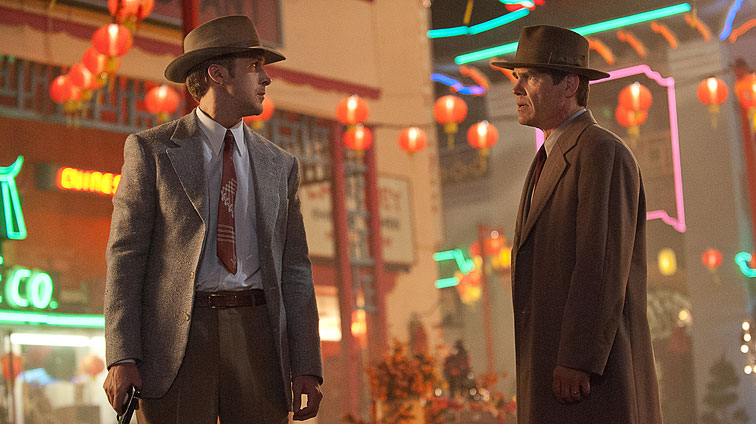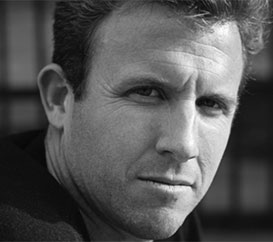
Making Sense of Things
Homicide detective-turned-screenwriter Will Beall explains why the filmmakers of Gangster Squad decided to reshoot a key sequence after last year's tragic Aurora, Colorado shooting and reflects on the difference between screen and real-life violence.
 Will Beall
Will Beall
I don't blame people for looking for answers when these things happen. I've seen thousands of action movies from the time I was probably eight, and it's never made me want to kill anyone.
There's no "normal" when it comes to screenwriters' personal histories, but Will Beall's, the first-time scribe behind the new film Gangster Squad, is definitely different. From the mid- 90s, he spent nearly a decade living the starkly unvarnished life of a beat cop and homicide detective in South Central Los Angeles. He's only been screenwriting since his debut novel based on his time as a gangland cop, was optioned by platinum-plated producer Scott Rudin a few short years ago. So when it comes to talking about the screenwriting process, Beall is as unpretentious as the stretch of asphalt he used to patrol.
When asked to expound on his writing craft, he grunts a dry, incredulous cackle and says, "I don't have any fucking craft."
He doesn't have anything against the idea, he just has trouble accepting that such lofty, artistic talk now involves him. His writing career began with notes he took after work that turned into his critically acclaimed novel L.A. Rex. Rudin optioned it and decided, despite the fact that Beall had never even read a screenplay, he was the best man to adapt it.
Rudin's decision reflects the fact that Beall's bare-knuckled personality belies a guy that really knows film and has a very clear grasp of what he's about.
Since leaving crime-fighting behind four years ago, he's written for the TV show Castle, adapted his own novel, and penned Gangster Squad, which is derived from the same-titled non-fiction book by author Paul Lieberman. In bang-bang fashion, he also earned the nod to write Warner Bros.' anticipated new DC Comics popcorn release Justice League. It's heady stuff, but nothing too daunting for a guy who looked death in the face every day at his previous job.
After last year's Aurora, Colorado movie theater tragedy, Gangster Squad made headlines when the filmmakers opted to delay the feature's release and reshoot the ending, which featured a gun battle at Grauman's Chinese Theater. The Writers Guild of America West website spoke to the cop-turned-screenwriter about that decision, the difference between movie and real-life violence, and the lonesomeness of his new gig as a writer.
I want to quickly touch on the timely issue of gun violence. First, as an ex-cop, novelist, and screenwriter, do you feel there's any correlation between movie violence and real-life violence?
No, none.
There are people out there blaming gun violence and these massacres on movies and video games. You feel that there's no correlation.
None. I mean, look, I don't blame people for looking for answers when these things happen. I've seen thousands of action movies from the time I was probably eight, and it's never made me want to kill anyone.
You've been witness to real murder, violence, and death, correct?
Yeah, more than most people.
Tell me about the difference between seeing stuff like that in the street versus watching it in a movie.
Well, in a movie it's make-believe. Especially in a movie like Gangster Squad, it's not a spoiler for me to tell you that the good guys win, and everything turns out the way it's supposed to. Everything turns out okay. The bad guy gets his in the end, and
Justice is done.
Yeah, justice is done, just like in a romantic comedy you know that they're going to end up together. The action and the car chases and the shootouts and the fist fights are fun. In real-life, violence is shitty, it's tragic and terrible They're completely different.
Tell me about the scene you reworked after Aurora?
I was in London when I heard about [the Aurora shooting]. It was terrible. It was chilling. It's not like we're making Zero Dark Thirty here, a historically accurate film [which] I think is a phenomenal movie and an extraordinary piece of journalism.
That's not what Gangster Squad is. The whole point of Gangster Squad is to entertain people and make em feel good.
That last thing you want is to dredge up something painful for people. There was a shootout in Grauman's Chinese movie theater It wasn't my decision, but the powers that be felt we should reshoot that scene, and I agreed. We restaged the sequence to take place in Chinatown. In some ways it's a better scene. When people watch the movie, you would never know [it was reshot].
You got into a really sweet situation here for a screenwriter, especially a new screenwriter. Tell me who you worked with writing this script, whose input you had.
Well, I had everybody. I had the studio and producers and ultimately a director and then actor. There are probably other guys that would tell you something different but for me the process of writing is really about rewriting. The studio has ideas about the kind of movie that they want and I was lucky enough to have smart people from the studio who were creative and understood how make a fun movie and producers that were on board. I don't know if there's any more collaborative director out there than Ruben [Fleischer]. I'm new at this, but I certainly haven't heard of one. He's a generous guy, he's an unpretentious guy, and likewise, he's a generous and unpretentious filmmaker. You know, every decision that he makes is calculated to entertain you, which is exactly what we're supposed to be doing.
Your screenwriting career begain when your first novel, L.A. Rex was optioned by Scott Rudin Productions. Tell me a little bit about that experience as basically a crash course in the scriptwriting process.
Yeah, a lot of it is dumb luck, you know? Rudin optioned the book and for whatever reason he got the idea that he wanted me to adapt it. In retrospect, it seems crazy I wouldn't have hired me, but then
But you know yourself.
That's true, but you know, there's a reason that Rudin has the track record that he does. Working with him and a guy named Mark Roybal that worked for him at the time, [was] like a graduate seminar in screenwriting. Look, I'm still figuring it out, but I definitely felt like after the experience of adapting L.A. Rex, I had a much better handle on how to do it than before.
And prior to that you had never tried to write a script, right?
That was it, yeah. I didn't know what the hell Final Draft was, you know?
That's important to know. So tell me now a little bit about your writing process or your routine, where you do it, how do you do it?
The process is that I force myself to sit down and write and hope it doesn't turn out shitty. Then if it turns out shitty, I change it.
That's pretty complex.
I'm a pretty complex guy. I'm a really subtle and complex guy.
So where do you do it?
I have an office now in Santa Monica that I rent I guess the one thing that I learned is that I don't have the discipline not to fuck around online so I do not have Wi-Fi in my office. If I'm on the computer I'm forced to write.
Do you just go weekdays, five days a week?
Yeah, I mean five days a week. I'm divorced, and on the days that I have my kid, I put in less time because I pick him up from school and then sometimes on weekends I'll get in there if I'm really
If you're feeling it?
Yeah, or I feel like I need to put in that time. And my wife writes, she works for Castle, which is how we met. Yeah, I mean the best part of all of this, the best part of changing jobs is that I get more time with my kid and I got a young, hot wife out of the deal.
I said that, you didn't say that.
I mean, I'm living the dream, dude.
So you were a cop working in South Central for 10 years in a high action environment. You were around people all the time. What is the change like to go into a room to write for a living, the solitude of writing? Has that been hard?
It was hard to get used to at first because, you know, I'd get antsy. For 10 years I was getting paid to play outside, you know? You're working with a partner, and there's camaraderie because you're around all these other dudes, and it's a little bit like, you know, you're part of a team. When you're [writing] I mean TV was that way, but when you're working in features, for the most part, it's you. Even during production, somebody, an actor or the director, will tell you the scene isn't working, and it's on you to go away and fix it.
You mentioned that, writing alone, you kind of fill the void by writing guys you'd want to work with.
Right. I mean it sounds goofy, but I don't get to hang out with those guys every day anymore so writing these movies you just make up guys that you want to hang out with. I mean you're going to be hanging out with them for a while. With Gangster Squad, I had the director and these actors and different people, and I felt like these characters were cool for everyone to hang out with for six months of their lives or whatever.
Then you get to write it so your guys always win in the end.
Yeah, exactly. You get to fix it. In real-life, especially with homicide, even when you solve the case, like the guy's still fucking dead, you know? In movies, you can fix things so good guys always win and bad guys get their comeuppance, and everything turns out okay.
You can make sense of things?
It all makes sense. I have the power to make sense of stuff that when I was on the job didn't make a lick of sense.
© 2013 Writers Guild of America West
